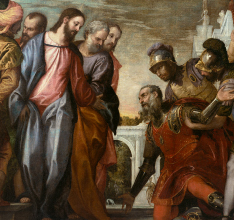Some years ago, I was involved in a Catholic-Evangelical dialogue. One of our Protestant brothers challenged the Catholics in the group to articulate clearly what the Gospel is. I knew what he was getting at: many Evangelicals pride themselves on the fact that they can succinctly sum up the Good News in a way that people find compelling and helpful, whereas many Catholics, it seems, get tongue-tied.
For most Evangelicals, the Gospel is some version of justification by grace through faith. We are sinners, hopelessly incapable of saving ourselves through any accomplishment of our own. But Jesus has died for our sins, and if we place our trust in him we will find eternal salvation. Some refer to the “Romans Road,” which is a series of texts from Paul to the Romans that sums up this itinerary. The clarity and simplicity of this teaching allow an Evangelical to respond with a confident “Yes” when asked, “Are you saved?” or even to give a specific date when asked “When were you saved?” I’d be willing to bet that most Catholics would start hemming and hawing when asked those same questions.
And that, in my judgment, is not all bad. Catholics hold that the Gospel cannot be reduced to the mechanics of justification, or to state it differently, that justification is a richer and denser reality than Martin Luther thought. The basic meaning of the “Good News” is the resurrection of Jesus from the dead. When the first Christians announced euangelion (glad tidings), that’s what they meant. “You killed him, but God raised him up” is the basic form of kerygmatic preaching. What this entails is that God’s love is more powerful than sin and death, more powerful than anything that is in the world. On fire with this good news, St. Paul could say Iesous Kyrios (Jesus is Lord), as opposed to Kaiser Kyrios (Caesar is Lord). The Good News is that the new and authentic King has won the decisive victory—and now it’s time to join his army. On the Catholic reading, this implies that one should become a member of the mystical body of the Church.
Now there is a further implication of all of this. Throughout his public ministry, Jesus spoke and acted in the very person of God. To the paralyzed man he said, “My son, your sins are forgiven.” As the skeptical bystanders rightly observed, only God can forgive sins. In reference to himself, Jesus declared, “You have a greater than the temple here.” Within a first century Jewish context, the only one who could coherently make such a claim is the one who is in fact worshipped in the temple. To his disciples, Jesus blithely announced, “Unless you love me more than your mother and father, more than your very life, you are not worthy of me.” Who could say that meaningfully except the one who is, in person, the highest good? As C.S. Lewis rightly saw, this leads to a trilemma: Jesus is either liar, lunatic, or Lord. The resurrection was construed as the definitive demonstration that he was who he said he was, as God’s own ratification of the extravagant claims of Jesus.
But this means that the dimensions of Jesus’ victory are expanded infinitely outward. As the God-man, Jesus represents and affects the deification of humanity. Jesus is God’s final and definitive rescuing of the human project. As the Church fathers put it over and over again, Deus fit homo ut homo fieret Deus, (God became human that humans might become God). In point of fact, that patristic adage was my response to my Protestant brother years ago. Long before the Reformation, the brightest Christians in the world would have summed up the good news with this ecstatic declaration of deification. This pithy formula includes, I would argue, everything that Evangelical Protestantism legitimately emphasizes but places those truths in a wider and more clarifying context.
For instance, Catholic theology clearly teaches that human beings are incapable of saving themselves. It unambiguously rules out any program of auto-salvation, or to give it its more technical description, Pelagianism. Catholic theology understands that we are like blind Bartimaeus, begging for sight and thereby stands athwart philosophies of perfectibility both ancient and modern. We are broken in such a way that we can’t fix ourselves, and hence we are compelled to sing: “O Come, O Come, Emmanuel and ransom captive Israel…” Therefore, we rely upon, we accept through faith, what God alone can do for us. Accordingly, the Council of Trent teaches that faith is the initium et radix omnis justificationis (the origin and root of all justification). We cannot get into the household of God unless we are graciously invited, unless the door is opened to us through faith.
But Catholic teaching insists that God wants us to live ever more fully, ever more joyfully and lovingly in that house! He wants us to cooperate with his grace and allow our natures to be perfected. This happens precisely in the community and through the life of the Church, which means the saints, the artistic heritage of Catholicism, the apostolic governance of the bishops, and especially the Sacraments and the Eucharist. If I might invoke the Fathers one final time, the Church is best conceived, not as a congregation of like-minded people, not the “Jesus Christ society”, but rather as the prolongation of the Incarnation across space and time. The Council of Trent speaks, as Protestantism does, of justification, but it also speaks of the “increase in justification,” the deification that comes through the sacramental life of the Church.
So what is the Gospel? God became one of us that we might become participants in his life!
